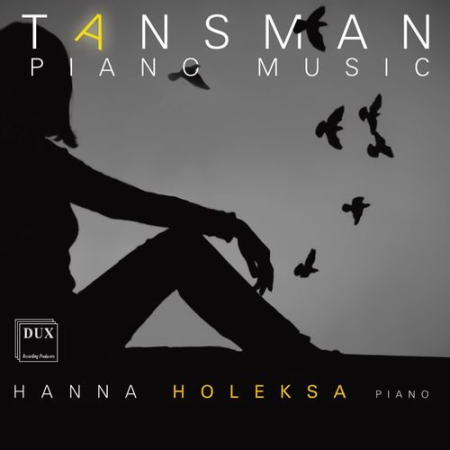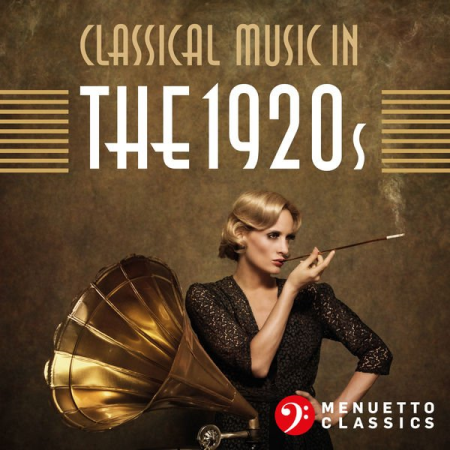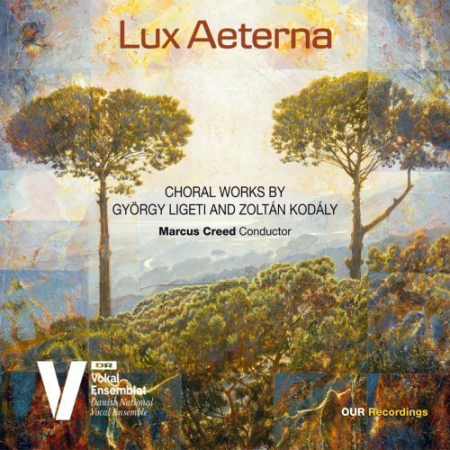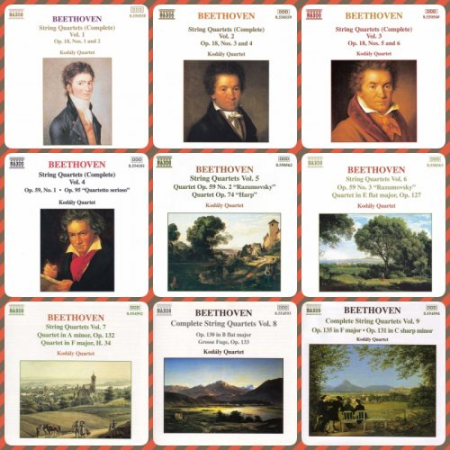VA - Listening to Bela Bartok (2022)
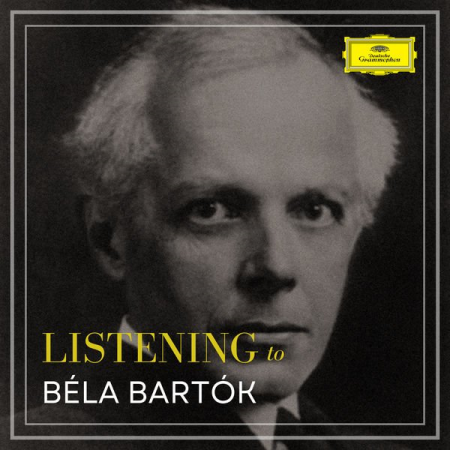
FLAC (tracks) / MP3 320 kbps | Classical | 17h 10 min | 4.05 / 2.3 GB
Through his far-reaching endeavors as composer, performer, educator, and ethnomusicolgist, Bela Bartok emerged as one of the most forceful and influential musical personalities of the 20th century. Born in Nagyszentmiklos, Hungary (now Romania), on March 25, 1881, Bartok began his musical training with piano studies at the age of five, foreshadowing his lifelong affinity for the instrument.
Following his graduation from the Royal Academy of Music in 1901 and the composition of his first mature works – most notably, the symphonic poem Kossuth (1903) – Bartok embarked on one of the classic field studies in the history of ethnomusicology. With fellow countryman and composer Zoltan Kodaly, he traveled throughout Hungary and neighboring countries, collecting thousands of authentic folk songs. Bartok's immersion in this music lasted for decades, and the intricacies he discovered therein, from plangent modality to fiercely aggressive rhythms, exerted a potent influence on his own musical language. In addition to his compositional activities and folk music research, Bartok's career unfolded amid a bustling schedule of teaching and perfog. The great success he enjoyed as a concert artist in the 1920s was offset somewhat by difficulties that arose from the tenuous political atmosphere in Hungary, a situation exacerbated by the composer's frank manner. As the specter of fascism in Europe in the 1930s grew ever more sinister, he refused to play in Germany and banned radio broadcasts of his music there and in Italy. A concert in Budapest on October 8, 1940, was the composer's farewell to the country which had provided him so much inspiration and yet caused him so much grief. Days later, Bartok and his wife set sail for America. In his final years Bartok was beleaguered by poor health. Though his prospects seemed sunnier in the final year of his life, his last great hope – to return to Hungary – was dashed in the aftermath of World War II. He died of leukemia in New York on September 26, 1945. The composer's legacy included a number of ambitious but unrealized projects, including a Seventh String Quartet; two major works, the Viola Concerto and the Piano Concerto No. 3, were completed from Bartok's in-progress scores and sketches by his pupil, Tibor Serly.
From its roots in the music he performed as a pianist – Mozart, Beethoven, Chopin, Brahms – Bartok's own style evolved through several stages into one of the most distinctive and influential musical idioms of the first half of the 20th century. The complete assimilation of elements from varied sources – the Classical masters, contemporaries like Debussy, folk songs – is one of the signal traits of Bartok's music. The polychromatic orchestral textures of Richard Strauss had an immediate and long-lasting effect upon Bartok's own instrumental sense, evidenced in masterpieces such as Music for Strings, Percussion, and Celesta (1936) and the Concerto for Orchestra (1945). Bartok demonstrated an especial concern with form in his exploitation and refinement of devices like palindromes, arches, and proportions based on the "golden section." Perhaps above all other elements, though, it is the ingenious application of rhythm that gives Bartok's music its keen edge. Inspired by the folk music he loved, Bartok infused his works with asymmetrical, somes driving, often savage, rhythms, which supply violent propulsion to works such as Allegro barbaro (1911) and the Sonata for Two Pianos and Percussion (1937). If a single example from Bartok's catalogue can be regarded as representative, it is certainly the piano collection Mikrokosmos (1926-1939), originally intended as a progressive keyboard pr for the composer's son, Peter. These six volumes, comprising 153 pieces, remain valuable not only as a pedagogical tool but as an exhaustive glossary of the techniques – melodic, harmonic, rhythmic, formal – that provided a vessel for Bartok's extraordinary musical personality.
Tracklist
01 Chicago Symphony Orchestra (CSO) - 6th Dance: She Tries to Attract the Real Prince with Her Seductive Dancing
02 Chicago Symphony Orchestra (CSO) - V. Swineherd's Dance
03 Tokyo String Quartet - 2. Prestissimo, con sordino
04 Boston Symphony Orchestra - 4. Intermezzo interrotto (Allegretto)
05 Andor Foldes - Bartok: Six Rumanian Folk Dances, Sz 56
06 Julia Varady - Door 6. "Csendes feher tavat latok"
07 Helmut Krebs - "Wunder ward euch kund heut'" Moderato (Sung In German)
08 Andor Foldes - Bartok: Sonatina Over Themes Of Peasants From Transsylvania, Sz 55
09 Chicago Symphony Orchestra (CSO) - V. Comodo
10 Julia Varady - "Nagy csukott ajtokat latok"
11 Julia Varady - Door 1. "Jaj!" "Mit latsz Mit latsz" "Lancok, kesek"
12 Dietrich Fischer-Dieskau - "Nezd, tundokol az en varam"
13 Julia Varady - "Feher rozsad tove veres"
14 Julia Varady - "Jaj! Jaj! Mi volt ez Mi sohajtott"
15 Hertha Topper - Wir sind am Ziele (Sung In German)
16 Tokyo String Quartet - 1. Prima parte (Moderato)
17 Tokyo String Quartet - 3. Scherzo. Alla bulgarese
18 Tokyo String Quartet - 4. Andante
19 Tokyo String Quartet - 5. Allegro molto
20 Tokyo String Quartet - 3. Non troppo lento
21 Chicago Symphony Orchestra (CSO) - Agitato: Again, the Frightened Tramps Discuss How to Eliminate the Mandarin
22 Chicago Symphony Orchestra (CSO) - II. Bear Melody
23 Chicago Symphony Orchestra (CSO) - Sostenuto: Third Decoy Game
24 Chicago Symphony Orchestra (CSO) - Molto Moderato: The Body of the Mandarin Bs to Glow with a Greenish Blue Light
25 Chicago Symphony Orchestra (CSO) - 5th Dance: The Princess Pulls and Tugs at the Wooden Prince and Tries to Make Him Dance
26 Julia Varady - "Nem akarom, hogy elottem"
27 Hertha Topper - Sieh nur den Schatz (Sung In German)
28 Tokyo String Quartet - 3. Ricapitolazione della prima parte (Moderato)
29 Dietrich Fischer-Dieskau - "Miert jottel hozzam, Judit"
30 Julia Varady - Door 3. "Oh, be sok kincs! Oh, be sok kincs!"
31 Tokyo String Quartet - 1. Mesto - Vivace
32 Andor Foldes - Book 5
33 Tokyo String Quartet - 1. Lento
34 Helmut Krebs - "Lange harrt der Alte" Andante (Sung In German)
35 Tokyo String Quartet - 2. Mesto - Marcia
36 Tokyo String Quartet - 2. Allegretto
37 Chicago Symphony Orchestra (CSO) - Sempre vivo: The Tramps Leap Out
38 Chicago Symphony Orchestra (CSO) - IV. Slightly Tipsy
39 Chicago Symphony Orchestra (CSO) - II. Allegro molto
40 Tokyo String Quartet - 3. Introduzione. Allegro - Allegro vivace
41 Chicago Symphony Orchestra (CSO) - III. Melody
42 Tokyo String Quartet - 4. Mesto
43 Geza Anda - III. Allegro molto
44 Tokyo String Quartet - 5. Finale. Allegro vivace
45 Boston Symphony Orchestra - 3. Elegia (Andante, non troppo)
46 Geza Anda - I. Allegretto
47 RIAS Orchestre Symphonique de Berlin - "Wunder hort ihr sagen" Molto moderato - Allegro molto (Sung In German)
48 Tokyo String Quartet - 3. Mesto - Burletta (Moderato)
49 Chicago Symphony Orchestra (CSO) - Piu mosso - Vivo - She Resists No Longer - They Embrace.
50 Jessye Norman - Door 3. "Oh, be sok kincs! Oh, be sok kincs!"
51 Andor Foldes - Bartok: Allegro Barbaro, BB 63, Sz. 49
52 Dietrich Fischer-Dieskau - Door 7. "Lasd a regi aszszonyokat"
53 Hertha Topper - Schau, die fruher'n Frauen all (Sung In German)
54 Hertha Topper - Was siehst - Tausend scharfe Waffen (Sung In German)
55 Tokyo String Quartet - 4. Allegretto pizzicato
56 Julia Varady - "Felsz-e" "A te varad fala veres!"
57 Geza Anda - II. Adagio religioso
58 Hertha Topper - Weißes stilles Wasser seh ich (Sung In German)
59 Chicago Symphony Orchestra (CSO) - Allegro: The Girl Sinks Down to Embrace Him
60 Chicago Symphony Orchestra (CSO) - IV. Molto tranquillo
61 Chicago Symphony Orchestra (CSO) - I. An Evening In The Village
62 Chicago Symphony Orchestra (CSO) - III. Allegro vivace
63 Chicago Symphony Orchestra (CSO) - Adagio: Suddenly The Mandarin's Head Appears
64 Julia Varady - Door 4. "Oh! viragok! Oh! ilatoskert!"
65 Hertha Topper - Weh - was siehst Du (Sung In German)
66 Dietrich Fischer-Dieskau - Door 5. "Ah!" "Lasdez az en birodalmam"
67 Dietrich Fischer-Dieskau - "Most csukodjon be az ajto"
68 Chicago Symphony Orchestra (CSO) - Allegro: Introduction
69 John Aler - III. Moderato
70 Chicago Symphony Orchestra (CSO) - Second Decoy Game
71 Jessye Norman - "Tudom, tudom, Kekszakallu"
72 Tokyo String Quartet - 2. Adagio molto
73 Geza Anda - III. Allegro molto
74 Hertha Topper - Dies ist also Blaubarts Feste (Sung In German)
75 Hertha Topper - Ah! - Sieh, soweit die Blicke reichen (Sung In German)
76 Chicago Symphony Orchestra (CSO) - I. Moderato
77 Chicago Symphony Orchestra (CSO) - Moderato: First Decoy Game
78 Jessye Norman - Door 2. "Mit latsz" "Szazkegyetlen szornyu fegyver"
79 Chicago Symphony Orchestra (CSO) - IV. Intermezzo interrotto (Allegretto)
80 Chicago Symphony Orchestra (CSO) - VI. Finale (Allegro)
81 Jessye Norman - "Az utolsot nem nyitom ki"
82 Yuri Bashmet - III. Allegro vivace
83 Jessye Norman - Door 4. "Oh! viragok! Oh! ilatoskert!"
84 Jessye Norman - Door 1. "Jaj!" "Mit latsz Mit latsz" "Lancok, kesek"
85 Jessye Norman - Door 6. "Csendes feher tavat latok"
86 Yuri Bashmet - II. Adagio religioso - Allegretto
87 Chicago Symphony Orchestra (CSO) - IV. Marcia funebre: Maestoso
88 Chicago Symphony Orchestra (CSO) - III. Intermezzo: Moderato
89 Chicago Symphony Orchestra (CSO) - 1st Dance: Dance of the Princess in the Forest
90 Chicago Symphony Orchestra (CSO) - In voller Blute
91 Gil Shaham - I. Allegro non troppo
92 Chicago Symphony Orchestra (CSO) - 7th Dance: Dismayed, the Princess Attempts to Hurry after the Prince, but the Forest Bars Her Way
93 Krystian Zimerman - I. Allegro moderato - Allegro
94 Chicago Symphony Orchestra (CSO) - I. Allegro non troppo
95 Jessye Norman - Prologue - Opening Scene. "Megerkeztunk"
96 Chicago Symphony Orchestra (CSO) - Introduction
97 Gil Shaham - I. Lassu: Moderato
98 Gil Shaham - I. Lassu: Moderato
99 Jessye Norman - "Ez a Kekszakallu vera"
100 Jessye Norman - "Nagy csukott ajtokat"
101 Chicago Symphony Orchestra (CSO) - 2nd Dance: Dance of the Trees
102 Gil Shaham - II. Friss: Allegretto moderato
103 Chicago Symphony Orchestra (CSO) - II. Scherzo: Allegro
104 Leif Ove Andsnes - III. Allegro molto
105 Pierre-Laurent Aimard - III. Allegro ma non troppo
106 Gil Shaham - II. Friss: Allegro moderato
107 Chicago Symphony Orchestra (CSO) - II. Giuoco della coppie (Allegretto scherzando)
108 Pierre-Laurent Aimard - II. Lento ma non troppo
109 Chicago Symphony Orchestra (CSO) - I. Preludio
110 Jessye Norman - Door 5. Kekszakallu: "Nezd hogy derul mar a varam"
111 Julia Varady - "Nyisd ki a hetedik ajtot!"
112 Dietrich Fischer-Dieskau - Opening Scene. "Megerkeztunk"
113 Hertha Topper - Große schwnde Turen (Sung In German)
114 Dietrich Fischer-Dieskau - "Az utolsot nem nyitom ki"
115 Dietrich Fischer-Dieskau - Door 2. "Mit latsz" "Szazkegyetlen szornyu fegyver"
116 Andor Foldes - Original Version
117 Tokyo String Quartet - 2. Allegro molto capriccioso
118 Tokyo String Quartet - 2. Seconda parte (Allegro)
119 Geza Anda - I. Allegro moderato - Allegro
120 Tokyo String Quartet - 3. Lento
121 Boston Symphony Orchestra - 5. Finale (Pesante - Presto)
122 Geza Anda - I. Allegro
123 Boston Symphony Orchestra - 1. Introduzione (Andante non troppo - Allegro vivace
124 Tokyo String Quartet - 1. Moderato
125 Geza Anda - II. Adagio - Piu adagio - Presto
126 Andor Foldes - Original Version
127 Andor Foldes - Bartok: Out Of Door, Sz. 81
128 Andor Foldes - Book 6
129 Boston Symphony Orchestra - Bartok: The Miraculous Mandarin, BB 82, Sz. 73 (Op. 19) - Suite
130 Krystian Zimerman - III. Allegro molto - Allegro
131 Chicago Symphony Orchestra (CSO) - Maestoso: The Mandarin Enters
132 John Aler - I. Molto moderato
133 Helene Grimaud - III. Allegro vivace
134 Chicago Symphony Orchestra (CSO) - III. Adagio
135 Chicago Symphony Orchestra (CSO) - IV. Allegro molto
136 Helene Grimaud - I. Allegretto
137 Chicago Symphony Orchestra (CSO) - III. Allegro assai
138 Chicago Symphony Orchestra (CSO) - II. Allegro
139 Chicago Symphony Orchestra (CSO) - III. Elegia (Andante, non troppo)
140 Krystian Zimerman - II. Andante
141 Hertha Topper - Ach! Blumenpracht (Sung In German)
142 Tokyo String Quartet - 1. Allegro
143 Dietrich Fischer-Dieskau - "Hajnalban az elsot leltem"
144 Boston Symphony Orchestra - 2. Giuoco della coppie (Allegretto scherzando)
145 Hertha Topper - Fruh am Morgen kam die erste (Sung In German)
146 Geza Anda - III. Allegro vivace
147 Tokyo String Quartet - 1. Allegro
148 Geza Anda - II. Andante
149 Chicago Symphony Orchestra (CSO) - I. Andante tranquillo
150 John Aler - II. Andante
151 Jessye Norman - Door 7. "Lasd a regi aszszonyokat"
152 Chicago Symphony Orchestra (CSO) - V. Finale (Pesante - Presto)
153 Leif Ove Andsnes - I. Allegro
154 Chicago Symphony Orchestra (CSO) - I. Introduzione (Andante non troppo - Allegro vivace)
155 Gidon Kremer - I. Andante sostenuto
156 Chicago Symphony Orchestra (CSO) - II. Molto adagio
157 Chicago Symphony Orchestra (CSO) - Dorftanz
158 Gil Shaham - II. Andante tranquillo
159 Helene Grimaud - II. Adagio religioso
160 Leif Ove Andsnes - II. Adagio - Piu adagio - Presto
161 Chicago Symphony Orchestra (CSO) - 3rd Dance: Dance of the Waves
162 Gidon Kremer - II. Allegro giocoso
163 Pierre-Laurent Aimard - I. Assai lento - Allegro molto
164 Gil Shaham - III. Allegro molto
165 Yuri Bashmet - I. Moderato - Lento parlando
166 Chicago Symphony Orchestra (CSO) - 4th Dance: Dance of the Princess with the Wooden Doll
DOWNLOAD
1dl.net
https://1dl.net/1i77fki565us/q8LBVVdc_BaleB_.part1.rar.html
https://1dl.net/8l7igp8nx9y7/q8LBVVdc_BaleB_.part2.rar.html
https://1dl.net/1riggo1ehnnt/q8LBVVdc_BaleB_.part3.rar.html
https://1dl.net/goiw3oqmaaq1/q8LBVVdc_BaleB_.part4.rar.html
https://1dl.net/9fb2h6k82vuc/q8LBVVdc_BaleB_.part5.rar.html
https://1dl.net/dwj47gp6utrs/q8LBVVdc_BelaB3_.part1.rar.html
https://1dl.net/y1xg29vrsavc/q8LBVVdc_BelaB3_.part2.rar.html
https://1dl.net/in2sp7297eel/q8LBVVdc_BelaB3_.part3.rar.html
uploadgig.com
https://uploadgig.com/file/download/1b6773C92d6341e5/q8LBVVdc_BaleB_.part1.rar
https://uploadgig.com/file/download/7cf1e95D88b04d7B/q8LBVVdc_BaleB_.part2.rar
https://uploadgig.com/file/download/Ea3F3c41a1fa1d3D/q8LBVVdc_BaleB_.part3.rar
https://uploadgig.com/file/download/0121A7d0b8d43740/q8LBVVdc_BaleB_.part4.rar
https://uploadgig.com/file/download/6140b868ca2f045c/q8LBVVdc_BaleB_.part5.rar
https://uploadgig.com/file/download/128edc6aDfcfd0bD/q8LBVVdc_BelaB3_.part1.rar
https://uploadgig.com/file/download/e3aBec3B67dd9b3d/q8LBVVdc_BelaB3_.part2.rar
https://uploadgig.com/file/download/622657a972a01E5E/q8LBVVdc_BelaB3_.part3.rar
rapidgator.net
https://rapidgator.net/file/37d60fabc6ad929d26027e438bb5c423/q8LBVVdc_BaleB_.part1.rar.html
https://rapidgator.net/file/e0f7f832032e7f2d8d764312e68bdaf8/q8LBVVdc_BaleB_.part2.rar.html
https://rapidgator.net/file/a9206f2257f75341c1c606a3d392415e/q8LBVVdc_BaleB_.part3.rar.html
https://rapidgator.net/file/40b7e1e7f8ab99b42bb8ffbe3735f488/q8LBVVdc_BaleB_.part4.rar.html
https://rapidgator.net/file/b6d48e90778aa8e4b66decbb16002a60/q8LBVVdc_BaleB_.part5.rar.html
https://rapidgator.net/file/30bd767ca2d0e1931f94d164101d9a17/q8LBVVdc_BelaB3_.part1.rar.html
https://rapidgator.net/file/64b479d52526c818035b35e878ba560a/q8LBVVdc_BelaB3_.part2.rar.html
https://rapidgator.net/file/fd6321e69dfd3221787db5b11bfbe8f1/q8LBVVdc_BelaB3_.part3.rar.html
